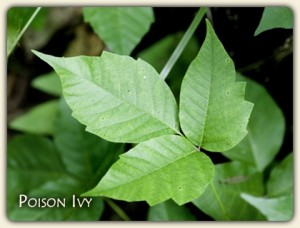Sure you’ve heard of poison ivy, yet you may wonder what poison ivy is and what it looks like.
Poison ivy has three leaflets with a shiny surface. If your skin comes in contact with the oil on the surface of the leaves, the effect is not immediate.
It will begin to bother you after several minutes. The rash that is a byproduct of poison ivy is not contagious. However; the oil of the plant can remain on your skin or clothing.
If anyone comes into contact with the oil, they will have poison ivy as well.
If you hike often, or have a job that requires you to come in contact with the plant often, use these tips to help identify and prevent encounters with it:
- Identify and avoid – you should be able to identify which dangerous plants you will encounter in any outdoor setting. This includes your backyard!
- Wear long pants, jackets, socks, and closed footwear – you have to ensure your safety whenever you are working in areas where poison ivy lives. The things you wear will be very helpful in avoiding the effects that poison ivy causes. As a bonus, this attire can also prevent mosquito bites..
- Wear gloves – if you need to handle foliage and you’re not sure if you’ll encounter poison ivy, wear gloves. Make sure they are leather, latex, or nitrile coated gloves. Plain cotton gloves can absorb the poisonous oil.
- Apply anti-ivy cream – a topical cream that creates a barrier against the offending oil.
- Avoid bringing a pet– your pet can be a carrier of poison ivy because their fur can absorb the oil of poison ivy.
- Look out for poison ivy on ponds and lakes – poison ivy loves to live around lakes and ponds, so make sure you keep a careful eye out for it.
Signs and Symptoms of Poison Ivy:
- Itching
- Swelling
- Redness
- Blisters
- Rash often appears in a straight line (from brushing against the plant)
Make sure you don’t pop any blisters. They won’t spread the rash if popped, but the area can get infected via open blisters.
If you do have a run-in with poison ivy, come to the urgent care. It can be very hard to stop yourself from scratching! We can help with the itching, pain, and infections that may arise from popped blisters.
Happy hiking!

